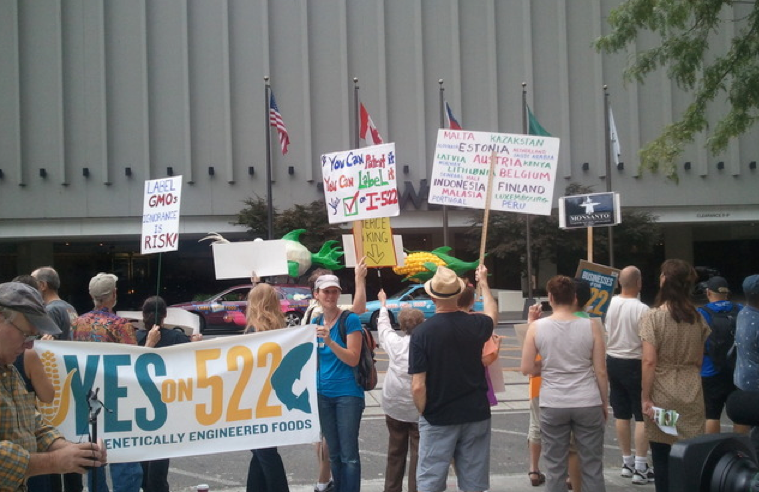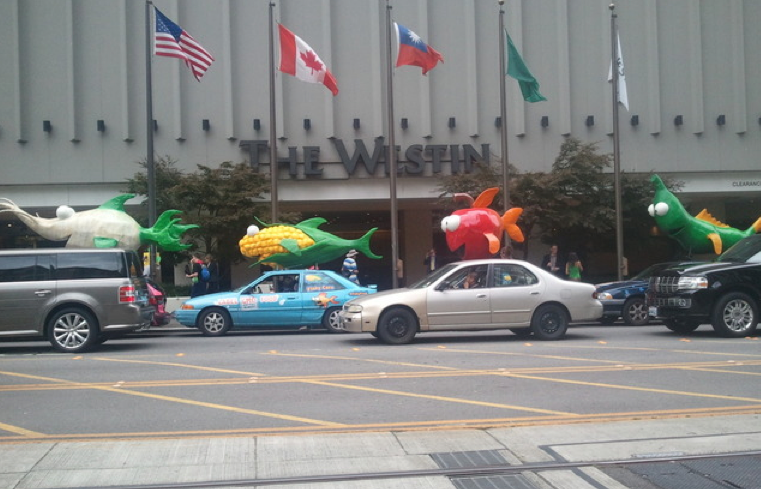One Question for the "No on I-522" Campaign

Last week, as the new Cola cub reporter, Josh sent me to cover a rally outside the Westin hotel against GMOs (genetically engineered organisms); the I-522 campaign was out in full force. On the ballot this November, I-522 would label food containing GMOs.
It was a pretty standard rally, though: speeches; photo-op props ("Fishy Cars" representing genetically engineered “Fishy Corn," "Fishy Tomatoes," "Fishy Sugar Beets," "Fishy Soy," and "Fishy Apples"); and demands like the right to know what's in the food we eat. “If there’s nothing to hide, why not label?” one of the speakers asked.

The most interesting thing was when I ended up on the phone with the "No on I-522" spokesperson, Dana Bieber.
Bieber told me I-522 is misleading for several reasons including that two-thirds of all food (including restaurant items, alcohol, and some dairy products) would be exempt from labeling.
This struck me as an odd objection from the anti-campaign, which is funded by five out-of-state corporate backers—nearly $1 million total from the Grocery Manufacturers Association, Monsanto, Dupont, Bayer, and Dow. Would they would prefer stronger legislation for GMO labeling?

One Question
I called her up again today to ask her if she would support a GMO-labeling initiative that encompassed all foods.
She opted not to answer, saying instead that her campaign doesn't think about "what-ifs" because that's not what voters are voting on.
"Our opposition is trying to confuse voters, trying to make it seem more complicated than it actually is...This [initiative] is just adding a little bit more information on the package so individual Washington shoppers can make the choice for themselves."—Pro-I-522 spokeswoman Elizabeth Larter.
Some of her other complaints about the initiative: it would put a "warning" labels on foods the public has been eating for decades (such as corn); and labeling would drive up prices for both food producers and consumers, since this labeling would only apply to Washington state.
Elizabeth Larter, communications director for the "Yes on 522" campaign, which also relies heavily on out-of-state money (California-based Dr. Bronner's Magic Soaps is the top contributor at $700,000) dismissed Bieber's concerns.
"It really shouldn't [drive up prices]," she said. "Food manufacturers are constantly re-labeling. They already label for genetically-engineered foods in other countries...and they haven't increased the costs here. So really, they're kind of misleading voters there."
In response to the inconsistency of labeling, she said, "the genetically engineered foods, which is predominantly processed or packaged foods, would be labeled. Corn, which is a common genetically engineered food, would be labeled as such."
As for my confusion about Bieber's apparently inconsistent objection about the limited aspect of I-522, Larter added, "Our opposition is trying to confuse voters, trying to make it seem more complicated than it actually is...This [initiative] is just adding a little bit more information on the package so individual Washington shoppers can make the choice for themselves."




